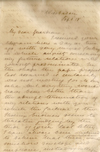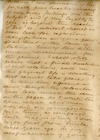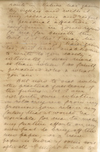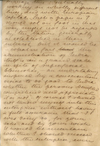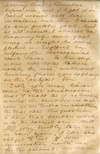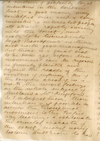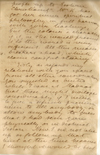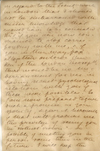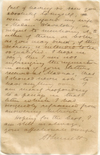Mahatma Letter of Sinnett to/from KH - 1883-09-18
| Quick Facts | |
|---|---|
| People involved | |
| Written by: | Koot Hoomi, A. P. Sinnett |
| Received by: | A. P. Sinnett, Koot Hoomi, H. P. Blavatsky |
| Sent via: | unknown |
| Dates | |
| Written on: | 18 September 1883 |
| Received on: | unknown |
| Other dates: | unknown |
| Places | |
| Sent from: | Weisbaden |
| Received at: | unknown |
| Via: | unknown |
This letter has not been published previously. A. P. Sinnett wrote to Mahatma Koot Hoomi, who added notes and gave the original to H. P. Blavatsky, with instructions to keep the letter.
Note to H. P. Blavatsky from K.H.
|
Note written in blue ink across the middle of page 10: To be kept at your office
|
NOTES: |
Page 1 of Sinnett letter transcription, image, and notes
|
My Dear Guardian, I received your telegram here a day or two ago, with very mixed feelings in which anxiety concerning my future relations with yourself predominated. In the shape the paper project last assumed it certainly was not worthy for its own sake, but anything would have been better than the abrupt termination of my relations with you, which the failure of the Phoenix business seems to threaten judging by the tenor of your last letter. I have always been inclined to believe that these relations would somehow develop and improve, instead of collapsing |
NOTES: |
Page 2
|
because I was conscious of the perfectly pure hearted sincerity of my own feelings on the subject, and of my loyalty to you, as beyond the reach of “tests” &c [et cetera] while I should as soon look for capricious changefullness on your part as on that of the laws of Nature. Even if this letter remains unanswered - for the present,- I shall still believe that a final dissolution of our relations, even in this physical life is something that cannot take place. In now very different a spirit, though the colourless lines look much the same on the paper, do I write this letter, which absit omen may end our correspondence for a time, as compared with that in which I wrote to you first from Simla three years ago. As my comprehension of your
|
NOTES: |
Page 3
|
rank in Nature has grown by degrees and with it my reverence and respect so personal affection and confidence in your regard for me (far beneath the level of it tho’ I may be in many ways) have grown too, and have enabled me to write to you easily and intimately,- even more so than when I so faintly perceived who and what you are. But now to deal with the practical questions of the future. For I am not quite sure whether in releasing me from my promise you retain any feeling that it would be desirable for me to make any further efforts on my own part to bring off the new paper,- or a new paper in India of some sort after all. I might be able to |
NOTES: |
Page 4
|
manage this eventually working on wholly different lines, and with European capital. Such a paper as I should set on foot in that way might not be regarded by the Natives generally as established in their interest, but it would be – what in fact the administration of India itself is on a grand scale in spite of superficial blemishes,- an undertaking inspired by a conscientious desire to do good to India whether the persons benefited comprehend and appreciate it or not. Of course I should not throw myself into this enterprise without having a full assurance that I was doing so, for your sake and by your wish. It would be uncertain whether I should succeed with the enterprise, even |
NOTES: |
Page 5
|
having that stimulus before me, and if I got it on foot it would still be uncertain whether I should do any public good. And at all events I should be throwing up such good doing as might be accomplished in England by helping the Theosophical work there. So the step is one not to be taken rashly by me, without hearing from you explicitly on the subject. For, 2ndly you may have come to the conclusion that I shall be of as much service in London in one way as in India in another[.] In that case the question is how that London work is to be carried on. Will M [three dots] very kindly take me in hand again, if you are obliged to cut off communication with me for the present. We have |
NOTES: |
Page 6
|
a nucleus of perfectly loyal members in the London Society – a good many very doubtful ones, and a large number of interested people all about, rapidly coming into the Society, and ready to be turned into loyal Theosophists in time and with good management. But there is a great deal to be done yet, before the movement can be regarded as firmly planted and beyond the reach of the disorders of infancy. One of the dangers ahead of us is due to the mixed feelings on the whole subject of Maitland and Mrs Kingsford. As I interpret these [them], their intention is if possible to annex the Theosophical movement to the Perfect Way teachings and obliterate the oriental character of the society, merely using Esoteric Buddhism to lead |
NOTES: |
Page 7
|
in regard to the Society – work in London that I should not be embarrassed with inner knowledge that would have to be concealed. But if you are now constrained to stop corresponding with me, and if you in this way pass altogether outside the ken of the London Theosoph. [abbreviation] there would be no embarrassment for me in having secret psychological relations with you if these were possible. So I am now prepared to give such a promise as you spoke of, and give it herewith if that will procure me the privilege of seeing you in “distinct vision” – as possibly of meeting you in person some time in the future. I will keep the |
NOTES: |
Page 8
|
fact of having so seen you absolutely to myself, even as regard my wife and Madam Blavatsky, or subject to mentioning it to either of them or both as you may direct, if the secrecy is intended to be so qualified. I hope in saying this I am not infringing the injunction in one of your letters recorded at Madras, that I should never ask to have anything done. I am merely responding to a passage in that letter which I had designedly refrained from answering hitherto. Hoping for the best, I am still as always, your affectionate disciple AP Sinnett |
NOTES: |
Page 9
|
in regard to the Society – work in London that I should not be embarrassed with inner knowledge that would have to be concealed. But if you are now constrained to stop corresponding with me, and if you in this way pass altogether outside the ken of the London Theosoph. [abbreviation] there would be no embarrassment for me in having secret psychological relations with you if these were possible. So I am now prepared to give such a promise as you spoke of, and give it herewith if that will procure me the privilege of seeing you in “distinct vision” – as possibly of meeting you in person some time in the future. I will keep the |
NOTES: |
Page 10
|
Note written in blue ink across the middle of page 10: To be kept at your office
|
NOTES: |
Context and background
The next known letter from K. H. to Sinnett was Mahatma Letter No. 114 (in chronological numbering system, or No. 83 in the Barker system). It was dated October 8, 1883.
The year of this letter is not stated, but can be derived from what Sinnett wrote about his September 1883 visit to Wiesbaden with members of the Gebhard family in the book Autobiography of Alfred Percy Sinnett.[1]
Physical description of letter
Two sheets of paper were folded and written on both sides. Notations by K.H. are in blue ink. This letter is in a private collection.
Publication history
This letter has never been published before.
Commentary about this letter
The chief significance of this letter is that it is a rare example of Sinnett's side of his correspondence with the Mahatmas, and that Madame Blavatsky was instructed to preserve it.
Additional resources
Notes
- ↑ Alfred Percy Sinnett, Autobiography of Alfred Percy Sinnett (London: Theosophical History Centre, 1986), 24.

